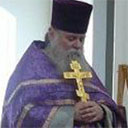The Scriptures tell us that, forty days after His Resurrection, our Lord appeared in the flesh to His disciples for a last time. At the end of this reunion the apostles saw Christ leave them and the world. We commemorate this event in the Feast of the Ascension.
St Luke describes what our Lord does as an ascension: “He was parted from them and carried up into heaven” (Luke 24: 51), “and a cloud received Him out of their sight” (Acts 1: 9). The inspired evangelist had to describe our Lord’s departure as if it were a movement from one location to another. Our feeble senses and limited minds have difficulty grasping divine mysteries; human language must often resort to images to express them. The Ascension, however, was not a transfer from earth to “heaven”, any more than Christ’s incarnation was a physical relocation the other direction.
The beautiful and insightful Akathist Hymn to the Theotokos refers to Christ’s incarnation as “a divine condescension and not a change of place.” So also the Ascension is not a change of place, the transfer of Christ from where He was (earth) to where He was not (heaven). Even while at work on earth the incarnate Lord was never absent from heaven. We express this idea in a prayer in the Liturgy which affirms His presence simultaneously “in the tomb with the body, in hell with the soul as God, in paradise with the thief, and on the throne with the Father and the Spirit . . . . ” The incarnation was not a change of place but the establishment of a new relationship between God and man in the person of Him who was both God and man. So also the Ascension marks the maturing of that relationship and the blossoming of the new life from it.
The new relationship inaugurated in our Lord’s incarnation is completed in His death and Resurrection. It is confirmed and proclaimed by His appearances to His followers for forty days after His rising. The time period, forty days, is significant. After His baptism Christ withdraws for forty days into the wilderness to confirm Himself in the identity and mission revealed by the Father and the Spirit at His baptism. His subsequent return from the desert launches His ministry.
In emulation of our Lord’s sojourn, Church practice prescribes forty-day intervals at special times for consolidation of gifts given and in preparation for new ministry inaugurated by these gifts. The Ascension likewise ends a period of preparation and opens a new era of divine activity. It closes the time of the Resurrection, but it looks ahead to the next great event, the descent of the Holy Spirit at Pentecost. By His Ascension, Christ steps back from the world so that the Spirit may begin His work. The Ascension closes the mission of the Word and anticipates that of the Spirit which opens on Pentecost.
The Spirit’s coming initiates the next phase in the new relationship between the Creator and His wayward creatures. The Spirit’s work touches both the world in general and believers. “[The Spirit], when He has come, will prove the world wrong concerning sin, concerning righteousness, and concerning judgment: Concerning sin, because they do not believe in Me; concerning righteousness, because I depart to My Father and you no longer see Me; concerning judgment, because the ruler of this world has been judged” (John 16: 8 – 11). Thus the Spirit confirms the sentence which the faithless world passes upon itself when it rejects the Father’s message spoken by Christ. “He who rejects Me and does not accept what I say has something that judges him: The message which I have spoken will itself judge him on the last day” (John 12: 48). When the world turns its back on the new relationship, it finds itself alone and without hope.
A more glorious destiny awaits those who respond in faith to Christ. The Spirit incorporates us into the new communion with the Father which the incarnate Word has established. “When the Spirit of truth has come, He will lead you to. all truth; . . . He will declare to you things to come He will take from what is Mine and declare it to you. All things whatever that the Father has are Mine” (John 16: 13 – 15). Thus our heavenly Father opens Himself to us in the ministry of the Word; He unites us to Himself in that blessed communion through the ministry of the Holy Spirit.
The Spirit establishes this new relationship with believers through the Church. He creates her, and He works in and through her. He sanctifies her members through the sacraments. By them He enfolds within Church those who hear Christ’s message, and He continues through the sacraments to nourish and heal them. He instructs them through the Scriptures, for the Spirit not only moved the authors of these inspired writings, but He continues to aid their readers to understand them aright and to apply them in their lives. He works through the disciplines of the spiritual life – through prayer, fasting, and alms – to encourage us in our struggles and to enrich us with His blessings.
We possess this grace because Christ did not “leave” the world at His ascension but instead confirmed by it the new relationship begotten in His Cross and Resurrection. By His ascension He opened the way for the Holy Spirit to come to us and to pour into our souls and hearts the blessings of new life.
***


